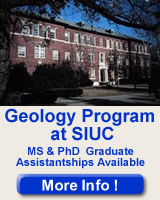Home » Careers » Graduate Assistantships and Fellowships
Graduate Assistantships and Fellowships in Geology
Dr. Steven Esling and Dr. Scott Ishman - Department of Geology, Southern Illinois University
Graduate students in geology have opportunities rarely available to undergraduate students to support their education in the form of graduate assistantships or fellowships. Both are awarded on a competitive basis. Depending on the type of award, funding may support only educational expenses, although some awards support both educational and living expenses. The three most common options for graduate student support in geology are research assistantship (RA), teaching assistantship (TA), and a fellowship.
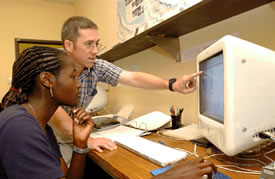
A Research Assistant (RA) working with her advisor in the lab at Southern Illinois University. An RA assignment commonly involves support for lab analyses and interpretation of results, which ideally leads directly to the student's thesis.
Research Assistantships
Generally, a research assistantship is funded through an external grant awarded to one of the faculty. The professor who obtained the grant has significant say in who gets the appointment. Interested parties in a research assistantship should contact the professor directly for more information. Your best strategy is to choose a particular research area, then contact faculty that share that interest at different universities across the country. You must sell your skills to the professor. Your research interests, and the perceptions of the professor of your ability to carry out research in that area, may significantly help your application and open doors to a challenging and rewarding research project that provides a thesis topic, as well as financial support for your education.
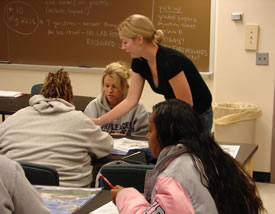
A Geology Teaching Assistant working with undergraduate students at Southern Illinois University.
Teaching Assistantships
|
A university hires graduate teaching assistants to support their teaching mission. Most teaching assistants act as instructors in introductory laboratories or help with grading. If you have some strong skills in a particular area of geology, you may be assigned to assist in one of the upper level courses. For example, a strong background in mineralogy may make you particularly well suited to assist in a mineralogy laboratory. Applicants for a teaching assistantship must convince the graduate admissions committee that they would make competent teachers, and that their English speaking skills are excellent. This is particularly important for the international applicant. A broad background in the geological sciences and a solid academic record are requirements for most teaching assistantships.
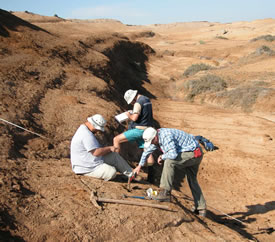
SIU Research Assistants (RAs) on the job in the Atacama Desert of northern Chile, gathering foraminiferal and paleomagnetic samples.
Graduate Fellowships
Unlike graduate assistantships, most, but not all fellowships do not require a specific work assignment. These fellowships are much like undergraduate scholarships, providing funds for tuition, fees, and living expenses. As you might expect, fellowships are awarded through a highly competitive process, and only the best students obtain them. Most require significant academic achievement at the undergraduate level, with strong scores in the Graduate Record Exam (GRE). Some fellowships were specifically created to encourage woman and minorities to choose a graduate education in the geological sciences. Many graduate programs nominate students that they believe are competitive for these awards.
Geology Careers - Related InformationEarth Science Job Resources Oil and Gas Jobs Geological Organizations Summer Geology Field Camps |
Funding
Not all graduate assistantships and fellowships are created equal, so be very careful when comparing offers. At first glance, one offer may look substantially better than another, but be sure to check the fine print. For example, one graduate assistantship may only provide direct financial support in the form of a stipend. You may have to pay tuition and fees from this stipend. Another assistantship may come with a small stipend, but waive tuition. Still another may not completely waive tuition, but provide in-state tuition to someone from out-of-state. Remember that the cost of education is also influenced by the cost of living in a community. In California, rent may be significantly greater than that in a small Midwestern town. Finally, both teaching and research assistantships require a work commitment. Most are "half time", which means that you are expected to work approximately 20 hours per week, although quarter time assistantships are common at some universities. Also, perceptions of what constitutes a 20 hour work week vary by institution, so another question you should ask after receiving an offer is what a typical assignment entails. Would you be expected to teach four labs a week, or three? How many hours per week would you have direct contact with the students?
![]() Thanks to Dr. Steven Esling and Dr. Scott Ishman, Department of Geology, Southern Illinois University, for contributing this article to Geology.com.
Thanks to Dr. Steven Esling and Dr. Scott Ishman, Department of Geology, Southern Illinois University, for contributing this article to Geology.com.
| More General Geology |
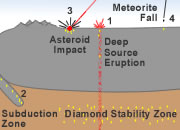 |
Diamonds from Coal? |
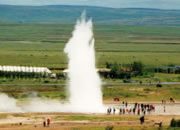 |
What is a Geyser? |
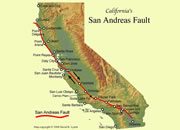 |
What is the San Andreas Fault? |
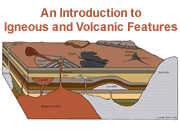 |
Igneous and Volcanic Features |
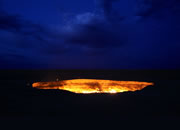 |
The Doorway to Hell |
 |
Topo Maps |
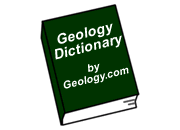 |
Geology Dictionary |
 |
Gifts That Rock |

Find Other Topics on Geology.com:
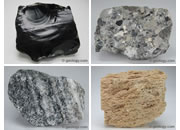
|
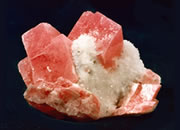
| ||

|

| ||
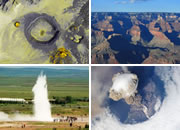
|

| ||

|
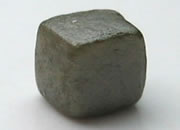
|

